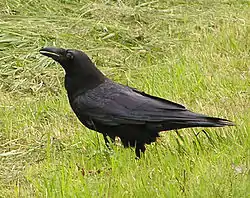からす
Japanese
Etymology 1
| Alternative spellings |
|---|
| 烏 鴉 |
From Old Japanese, from Proto-Japonic *karasu.
Compound of から (kara, “caw”, onomatopoeia, imitative of a crow's caw) + す (su, “bird”, ancient suffix appearing in certain bird names).[1] Compare the す (su) in 鶯 (uguisu), 杜鵑 (hototogisu), モズ (mozu).
Usage notes
Commonly spelled 烏 in kanji. When this spelling is used on its own (as opposed to in compounds), karasu is the most common reading.
As with many terms that name organisms, this term is often spelled in katakana, especially in biological contexts (where katakana is customary), as カラス.
Derived terms
Derived terms
- 烏が鵜の真似 (karasu ga u no mane)
- 烏座 (Karasuza): the Corvus constellation
- 烏の行水 (karasu no gyōzui): a quick bath
- 濡烏 (nuregarasu): jet-black
- 八咫烏 (yatagarasu): three legged crow in Japanese mythology
- 渡烏 (watarigarasu): common raven
Verb
からす • (karasu) transitive godan (stem からし (karashi), past からした (karashita))
| Japanese verb pair | |
|---|---|
| active | からす |
| mediopassive | かれる |
Conjugation
Conjugation of "からす" (See Appendix:Japanese verbs.)
| Katsuyōkei ("stem forms") | |||
|---|---|---|---|
| Mizenkei ("imperfective") | からさ | karasa | |
| Ren’yōkei ("continuative") | からし | karashi | |
| Shūshikei ("terminal") | からす | karasu | |
| Rentaikei ("attributive") | からす | karasu | |
| Kateikei ("hypothetical") | からせ | karase | |
| Meireikei ("imperative") | からせ | karase | |
| Key constructions | |||
| Passive | からされる | karasareru | |
| Causative | からさせる からさす |
karasaseru karasasu | |
| Potential | からせる | karaseru | |
| Volitional | からそう | karasō | |
| Negative | からさない | karasanai | |
| Negative continuative | からさず | karasazu | |
| Formal | からします | karashimasu | |
| Perfective | からした | karashita | |
| Conjunctive | からして | karashite | |
| Hypothetical conditional | からせば | karaseba | |
Classical conjugation of "からす" (サ行四段活用, see Appendix:Japanese verbs.)
| Stem forms | |||
|---|---|---|---|
| Irrealis (未然形) | からさ | karasa | |
| Continuative (連用形) | からし | karasi | |
| Terminal (終止形) | からす | karasu | |
| Attributive (連体形) | からす | karasu | |
| Realis (已然形) | からせ | karase | |
| Imperative (命令形) | からせ | karase | |
| Key constructions | |||
| Negative | からさず | karasazu | |
| Contrasting conjunction | からせど | karasedo | |
| Causal conjunction | からせば | karaseba | |
| Conditional conjunction | からさば | karasaba | |
| Past tense (firsthand knowledge) | からしき | karasiki | |
| Past tense (secondhand knowledge) | からしけり | karasikeri | |
| Perfect tense (conscious action) | からしつ | karasitu | |
| Perfect tense (natural event) | からしぬ | karasinu | |
| Perfect-continuative tense | からせり からしたり | karaseri karasitari | |
| Volitional | からさむ | karasamu | |
References
- Shōgaku Tosho (1988) 国語大辞典(新装版) [Unabridged Dictionary of Japanese (Revised Edition)] (in Japanese), Tōkyō: Shogakukan, →ISBN
- Matsumura, Akira, editor (2006), 大辞林 [Daijirin] (in Japanese), Third edition, Tōkyō: Sanseidō, →ISBN
- NHK Broadcasting Culture Research Institute, editor (1998), NHK日本語発音アクセント辞典 [NHK Japanese Pronunciation Accent Dictionary] (in Japanese), Tōkyō: NHK Publishing, →ISBN
Old Japanese
Quotations
For quotations using this term, see Citations:からす.
This article is issued from Wiktionary. The text is licensed under Creative Commons - Attribution - Sharealike. Additional terms may apply for the media files.
